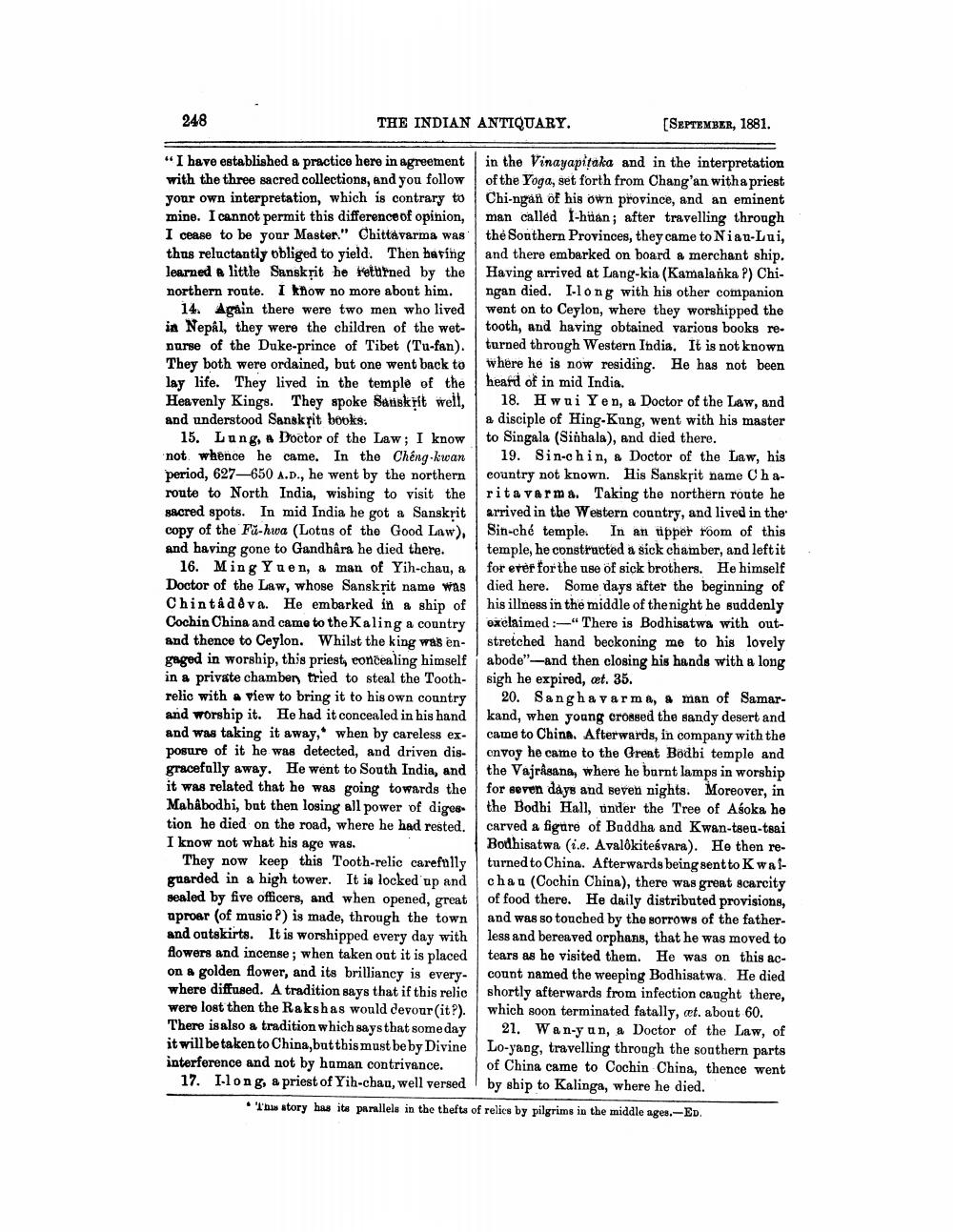________________
248
THE INDIAN ANTIQUARY.
"I have established a practice here in agreement with the three sacred collections, and you follow your own interpretation, which is contrary to mine. I cannot permit this difference of opinion, I cease to be your Master." Chittavarma was thus reluctantly obliged to yield. Then having learned a little Sanskrit he returned by the northern route. I know no more about him.
14. Again there were two men who lived in Nepal, they were the children of the wetnurse of the Duke-prince of Tibet (Tu-fan). They both were ordained, but one went back to lay life. They lived in the temple of the Heavenly Kings. They spoke Sanskrit well, and understood Sanskrit books.
15. Lung, a Doctor of the Law; I know not whence he came. In the Chêng-kwan period, 627-650 A.D., he went by the northern route to North India, wishing to visit the sacred spots. In mid India he got a Sanskrit copy of the Fu-hwa (Lotus of the Good Law), and having gone to Gandhara he died there.
16. Ming Yuen, a man of Yih-chau, a Doctor of the Law, whose Sanskrit name was Chintâdêva. He embarked in a ship of Cochin China and came to the Kaling a country and thence to Ceylon. Whilst the king was engaged in worship, this priest, concealing himself in a private chamber, tried to steal the Toothrelic with a view to bring it to his own country and worship it. He had it concealed in his hand and was taking it away, when by careless exposure of it he was detected, and driven disgracefully away. He went to South India, and it was related that he was going towards the Mahâbodhi, but then losing all power of diges tion he died on the road, where he had rested. I know not what his age was.
They now keep this Tooth-relic carefully guarded in a high tower. It is locked up and sealed by five officers, and when opened, great uproar (of music?) is made, through the town and outskirts. It is worshipped every day with flowers and incense; when taken out it is placed on a golden flower, and its brilliancy is everywhere diffused. A tradition says that if this relic were lost then the Rakshas would devour (it?). There is also a tradition which says that some day it will be taken to China,but this must be by Divine interference and not by human contrivance.
17. I-long, a priest of Yih-chau, well versed
This story has its parallels in the thefts of
[SEPTEMBER, 1881.
in the Vinayapitaka and in the interpretation of the Yoga, set forth from Chang'an with a priest Chi-ngan of his own province, and an eminent man called I-huan; after travelling through the Southern Provinces, they came to Niau-Lui, and there embarked on board a merchant ship. Having arrived at Lang-kia (Kamalanka ?) Chingan died. I-long with his other companion went on to Ceylon, where they worshipped the tooth, and having obtained various books returned through Western India. It is not known where he is now residing. He has not been heard of in mid India.
18. Hwui Yen, a Doctor of the Law, and a disciple of Hing-Kung, went with his master to Singala (Sinhala), and died there.
19. Sin-chin, a Doctor of the Law, his country not known. His Sanskrit name Charita varma. Taking the northern route he arrived in the Western country, and lived in the Sin-ché temple. In an upper room of this temple, he constructed a sick chamber, and left it for ever for the use of sick brothers. He himself died here. Some days after the beginning of his illness in the middle of the night he suddenly exclaimed:" There is Bodhisatwa with outstretched hand beckoning me to his lovely abode"-and then closing his hands with a long sigh he expired, æet. 35.
20. Sangha varma, a man of Samarkand, when young crossed the sandy desert and came to China. Afterwards, in company with the envoy he came to the Great Bodhi temple and the Vajrasana, where he burnt lamps in worship for seven days and seven nights. Moreover, in the Bodhi Hall, under the Tree of Asoka he carved a figure of Buddha and Kwan-tsen-tsai Bodhisatwa (i.e. Avalokitesvara). He then returned to China. Afterwards being sent to K walchau (Cochin China), there was great scarcity of food there. He daily distributed provisions, and was so touched by the sorrows of the fatherless and bereaved orphans, that he was moved to tears as he visited them. He was on this account named the weeping Bodhisatwa. He died shortly afterwards from infection caught there, which soon terminated fatally, æet. about 60.
21. Wan-yun, a Doctor of the Law, of Lo-yang, travelling through the southern parts of China came to Cochin China, thence went by ship to Kalinga, where he died. relics by pilgrims in the middle ages.-ED.




